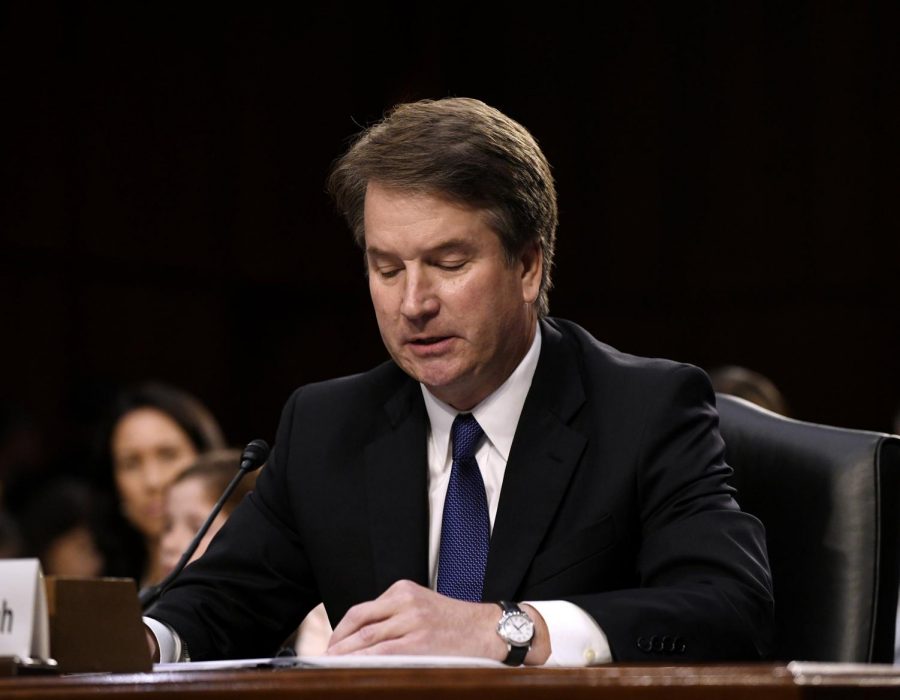Kavanaugh’s documents crucial to public
Opinion columnist Jack Ave writes about President Trump’s SCOTUS nominee Brett Kavanaugh and his controversial history.
Sep 6, 2018
Senator Schumer: Were you involved in any way in the Counsel’s Office in opining about the proper use of torture?
Mr. Kavanaugh: No, Senator. The first time I learned of that memo, I believe, was-
Senator Schumer: I did not ask about the memo. I asked just in general.
Mr. Kavanaugh: No, Senator.
– Committee of the Judiciary
United States Senate, May 9th, 2006
This week, President Trump’s nominee for the Supreme Court, Brett Kavanaugh, is testifying in front of the Senate Judiciary Committee. This committee investigates judicial appointments and provides a recommendation to the Senate before the confirmation vote. Especially when it comes to a Supreme Court Justice, whose tenure is indefinite, the recommendation of the judiciary committee is extremely influential.
Mr. Kavanaugh currently serves as a United States Circuit judge for the DC circuit court of appeals. He is no stranger to cross-examination from the twenty-one person committee. Kavanaugh made his first appearance in front of this committee in 2006 when President George W. Bush nominated him to his current position after his brief tenure as council to the White House.
When considering Kavanaugh for the highest judicial institution in our country, we must carefully review reports that call into question the truthfulness of Kavanaugh’s 2006 testimony, as well as his involvement in the detention of inmates at Guantánamo Bay.
A 2007 report from the Washington Post indicates that Kavanaugh was involved in shaping legal representation for detainees. The Pulitzer Prize-winning story claimed that Kavanaugh used his experience as a former clerk to Justice Kennedy as insight on how to direct policy to ensure the perceived constitutionality of indefinite detention without representation.
Senior member of the committee, Senator Patrick Leahy, claims that Kavanaugh played a crucial role in the early 2000’s determining the ‘legality of detainee policies,’ referring to the treatment of suspected enemy combatants imprisoned indefinitely. This denial of the due process of the accused denies justice as a cornerstone to our democracy.
For the current committee, it has been difficult to determine the extent of Kavanaugh’s involvement. Days before his SCOTUS confirmation hearing, the White House announced that they were to withhold over 100,000 documents from Kavanaugh’s time as executive council.
Kavanaugh may or may not have misled the Senate Judiciary Committee during his circuit confirmation in 2006. Senator Richard Durbin told NPR a year after the first hearing that he feels “perilously close to being lied to”. Senator Leahy wrote in July that “…these accounts are impossible to reconcile with Judge Kavanaugh’s sworn testimony.”
Therefore, in order to properly vet the SCOTUS nominee, I believe that the Senate judiciary Committee must have access and time to review the documents from Kavanaugh’s stint in the White House.
The committee and the informed public must fully understand how Kavanaugh’s potential tenure on the Supreme Court could give greater political deference to the executive branch, even if the executive’s policies violate fundamental human rights. Without the committee’s access to these documents, the extent of Kavanaugh’s involvement in the advancement and protection of inhumane practices is unknown.
If the nominee to the highest judicial body is willing to deceive the legislature in order to protect executive overreach, a concerned citizen might wonder about the fleeting importance of the separation of powers.
















